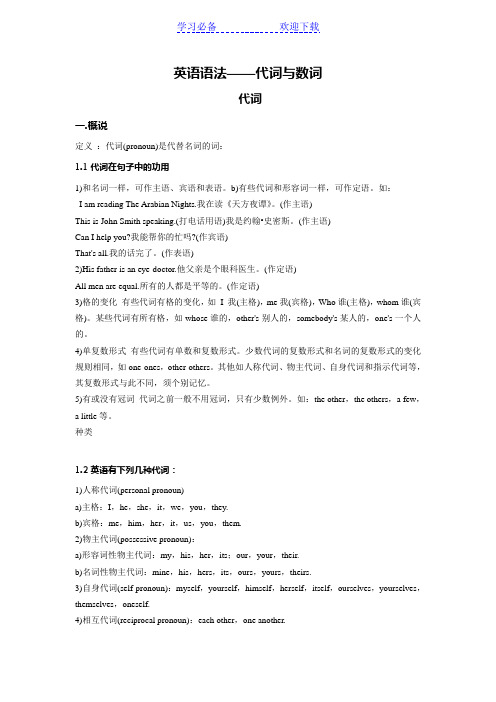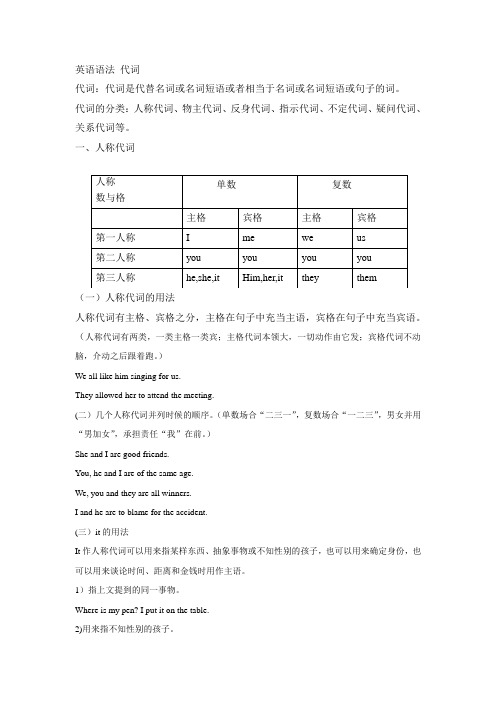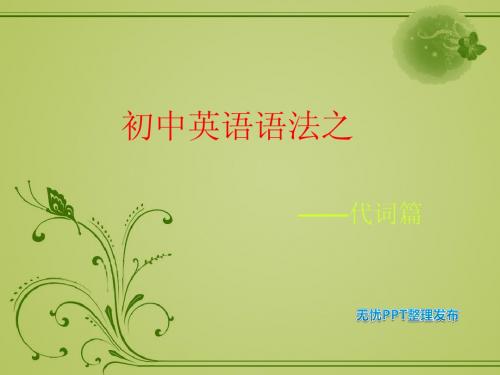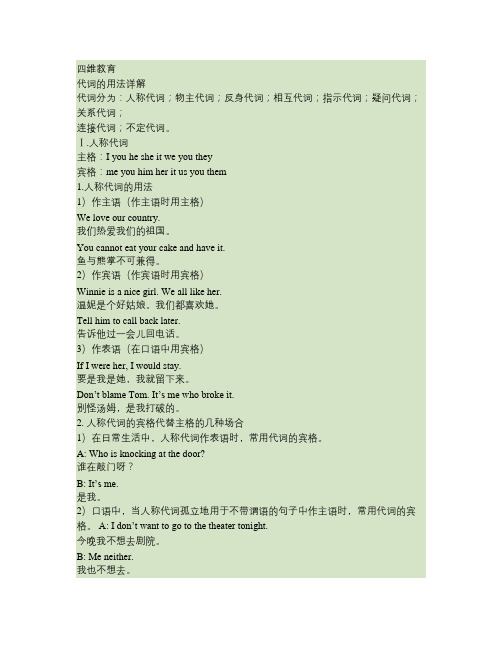英语语法---代词的用法
英语语法--代词

英语语法——代词与数词代词一.概说定义:代词(pronoun)是代替名词的词:1.1代词在句子中的功用1)和名词一样,可作主语、宾语和表语。
b)有些代词和形容词一样,可作定语。
如:I am reading The Arabian Nights.我在读《天方夜谭》。
(作主语)This is John Smith speaking.(打电话用语)我是约翰•史密斯。
(作主语)Can I help you?我能帮你的忙吗?(作宾语)That's all.我的话完了。
(作表语)2)His father is an eye-doctor.他父亲是个眼科医生。
(作定语)All men are equal.所有的人都是平等的。
(作定语)3)格的变化有些代词有格的变化,如I 我(主格),me我(宾格),Who谁(主格),whom谁(宾格)。
某些代词有所有格,如whose谁的,other's别人的,somebody's某人的,one's一个人的。
4)单复数形式有些代词有单数和复数形式。
少数代词的复数形式和名词的复数形式的变化规则相同,如one-ones,other-others。
其他如人称代词、物主代词、自身代词和指示代词等,其复数形式与此不同,须个别记忆。
5)有或没有冠词代词之前一般不用冠词,只有少数例外。
如:the other,the others,a few,a little等。
种类1.2英语有下列几种代词:1)人称代词(personal pronoun)a)主格:I,he,she,it,we,you,they.b)宾格:me,him,her,it,us,you,them.2)物主代词(possessive pronoun):a)形容词性物主代词:my,his,her,its;our,your,their.b)名词性物主代词:mine,his,hers,its,ours,yours,theirs.3)自身代词(self-pronoun):myself,yourself,himself,herself,itself,ourselves,yourselves,themselves,oneself.4)相互代词(reciprocal pronoun):each other,one another.5)指示代词(demonstrative pronoun):this,that,these,those,such,same.6)疑问代词(interrogative pronoun):who,whom,whose,which,what.7)关系代词(relative pronoun):who,whom,whose,which,that.8)不定代词(indefinite pronoun):some,something,somebody,someone,any,anything,anybody,anyone,no,nothing,nobody,no one,every,everything,everybody,everyone,each,much,many,little,a little,few,a few,other,another,all,none,one,both,either,neither.二.人称代词概说表示"我',、"你"、"他"、"我们"、"你们"、"他们"等的词,叫做人称代词。
初中英语语法---代词

代词考点一:人称代词1.人称代词的分类人称代词分为主格和宾格。
2. 人称代词的用法(1) 人称代词的主格在句中充当主语,它们的人称、数和性别取决于它们所指代的名词或代词。
如:①Mary is my friend. She is from the USA. 玛丽是我的朋友。
她来自美国。
② They are my grandparents. 他们是我的祖父母。
(2) 人称代词的宾格在句中充当动词、介词的宾语或表语。
如:①I don't know her. 我不认识她。
(作动词know的宾语)② Sports are good for you, for him and for her-for all of us! 体育运动对你、对他,还有她---对我们大家都有好处! (作介词for和of的宾语)③-Who is in the classroom? 是谁在教室里?-It's her! 是她! (作表语)(3) 如果出现多个人称代词,单数并列时按照“二、三、一”的人称顺序排列,即you, he, she and I或you, him, her and me; 复数并列时按照“一、二、三”的人称顺序排列,即we, you and they或us, you and them.如果需要承担责任,说话者则需要把第一人称放在第一位。
如:1. You, he and I are in the same class. 你、我、他在一个班。
2. You, she and I should work together to solve this problem. 你、她和我应当一起努力解决这个问题。
3. I and Li Lei broke the window. 我和李雷把窗户打破了。
考点二:物主代词1. 物主代词的分类物主代词分为形容词性物主代词和名词性物主代词。
2. 物主代词的用法(1) 形容词性物主代词用来作定语,修饰名词。
英语语法——代词与数词

英语语法——代词与数词代词一.概说定义:代词(pronoun)是代替名词的词:1.1代词在句子中的功用1)和名词一样,可作主语、宾语和表语。
b)有些代词和形容词一样,可作定语。
如:I am reading The Arabian Nights.我在读《天方夜谭》。
(作主语)This is John Smith speaking.(打电话用语)我是约翰•史密斯。
(作主语)Can I help you?我能帮你的忙吗?(作宾语)That's all.我的话完了。
(作表语)2)His father is an eye-doctor.他父亲是个眼科医生。
(作定语)All men are equal.所有的人都是平等的。
(作定语)3)格的变化有些代词有格的变化,如I 我(主格),me我(宾格),Who谁(主格),whom谁(宾格)。
某些代词有所有格,如whose谁的,other's别人的,somebody's某人的,one's一个人的。
4)单复数形式有些代词有单数和复数形式。
少数代词的复数形式和名词的复数形式的变化规则相同,如one-ones,other-others。
其他如人称代词、物主代词、自身代词和指示代词等,其复数形式与此不同,须个别记忆。
5)有或没有冠词代词之前一般不用冠词,只有少数例外。
如:the other,the others,a few,a little等。
种类1.2英语有下列几种代词:1)人称代词(personal pronoun)a)主格:I,he,she,it,we,you,they.b)宾格:me,him,her,it,us,you,them.2)物主代词(possessive pronoun):a)形容词性物主代词:my,his,her,its;our,your,their.b)名词性物主代词:mine,his,hers,its,ours,yours,theirs.3)自身代词(self-pronoun):myself,yourself,himself,herself,itself,ourselves,yourselves,themselves,oneself.4)相互代词(reciprocal pronoun):each other,one another.5)指示代词(demonstrative pronoun):this,that,these,those,such,same.6)疑问代词(interrogative pronoun):who,whom,whose,which,what.7)关系代词(relative pronoun):who,whom,whose,which,that.8)不定代词(indefinite pronoun):some,something,somebody,someone,any,anything,anybody,anyone,no,nothing,nobody,no one,every,everything,everybody,everyone,each,much,many,little,a little,few,a few,other,another,all,none,one,both,either,neither.二.人称代词概说表示"我',、"你"、"他"、"我们"、"你们"、"他们"等的词,叫做人称代词。
英语语法 代词

英语语法 代词代词:代词是代替名词或名词短语或者相当于名词或名词短语或句子的词。
代词的分类:人称代词、物主代词、反身代词、指示代词、不定代词、疑问代词、关系代词等。
一、人称代词(一)人称代词的用法人称代词有主格、宾格之分,主格在句子中充当主语,宾格在句子中充当宾语。
(人称代词有两类,一类主格一类宾;主格代词本领大,一切动作由它发;宾格代词不动脑,介动之后跟着跑。
) We all like him singing for us. They allowed her to attend the meeting.(二)几个人称代词并列时候的顺序。
(单数场合“二三一”,复数场合“一二三”,男女并用“男加女”,承担责任“我”在前。
) She and I are good friends. You, he and I are of the same age. We, you and they are all winners. I and he are to blame for the accident. (三)it 的用法It 作人称代词可以用来指某样东西、抽象事物或不知性别的孩子,也可以用来确定身份,也可以用来谈论时间、距离和金钱时用作主语。
1)指上文提到的同一事物。
Where is my pen? I put it on the table. 2)用来指不知性别的孩子。
人称 数与格 单数 复数主格 宾格 主格 宾格 第一人称 I me we us 第二人称 you you you you 第三人称 he,she,itHim,her,ittheythemShe is pregnant. I hope it will be a girl.3)用来确定身份。
Someone is knocking at the door. I don’t know who it is.It’s your mother on the phone.4)谈论时间、距离、天气时作主语。
初中英语语法_代词

注意:
oneself 有单复数之分 * I enjoy myself. * Children, help yourselves to some fish.
1.The man is rich , he can buy ___ a lot of things . A. he B. his C. himself
It的用法:
1:it作为人称代词时,可以表示天气、
距离、时间、环境等
What’ the weather like today? – It’s windy.
今天的天气怎么样?- 有风。
It’s about five minutes’ walk from home to school.
从家到学校的路程大约5分钟。
3.another/other
another 泛指三个或三个以上中的另一
个
I don’t want this coat. Please show me another.
other 后面接名词,泛指别的、其他
的
Do you have any other questions?
4. the other/others/the others
4. ____ school is much bigger than ____.
A. Our , their
B. Ours , theirs
C. Our , theirs
5. The dog is so poor because ____ leg is badly hurt .
A. it B. its C. it’s
初中英语语法之
——代词篇
代词的分类
人称代词 物主代词 反身代词 不定代词 指示代词 疑问代词
小学英语语法-代词

单数反身代词的词尾都是-self,复数反身代词的词尾都是-selves. 反身代词本身没有所有格,所以要用own来代替,可以加强句子的语气。如: He made it with his own hands. 她用自己的双手做的。
练习题——反身代词
Yourselves itself myself himself Herself themselves yourself ourselves
人称代词是为了避免重复,用来代替前面提到过的人、动物、事物的名称代词。
★注:说话的人叫做第一人称;听话的人叫做第二人称;被谈到的人(或动物、物品)叫做第三人称。
1.人称代词
①人称代词的主格在句子中做主语
人称代词的基本用法
②人称代词的宾格在句子中作宾语或表语。
I’m a student. Good morning, boys and girls . You may sit down now.
单击此处添加小标题
4.2指示代词在意义上有远近的差别
练习题——指示代词
This
That
These
Those
This
that
that
This
This/That
根据文中提示,完成句子 例:这是你卡特的书包。 This is Kate’s bag 1.这是一只斑马。 ______is a zebra. 2.那是一只袋鼠 _____is a kangaroo. 3.这些是山羊,那些是绵羊。 _____are goats. _____are sheep. 4.你好,露西!这是我的同学凯茜 Hello , Lucy! _____is my classmate Cathy. 5.喂,我是汤姆,你是大卫吗? Hello , this is TOM .Is _____David? 6.喂,请问你是哪位? Hello . Who is _______speaking , please? 7.这边走,请? _______way , please. 8.约翰没有通过这次考试。这令他的老师非常生气。 John didn’t pass the exam. _________made his teacher very angry.
高中英语代词的用法详解

四维教育代词的用法详解代词分为:人称代词;物主代词;反身代词;相互代词;指示代词;疑问代词;关系代词;连接代词;不定代词。
Ⅰ.人称代词主格:I you he she it we you they宾格:me you him her it us you them1.人称代词的用法1)作主语(作主语时用主格)We love our country.我们热爱我们的祖国。
You cannot eat your cake and have it.鱼与熊掌不可兼得。
2)作宾语(作宾语时用宾格)Winnie is a nice girl. We all like her.温妮是个好姑娘。
我们都喜欢她。
Tell him to call back later.告诉他过一会儿回电话。
3)作表语(在口语中用宾格)If I were her, I would stay.要是我是她,我就留下来。
Don’t blame Tom. It’s me who broke it.别怪汤姆,是我打破的。
2. 人称代词的宾格代替主格的几种场合1)在日常生活中,人称代词作表语时,常用代词的宾格。
A: Who is knocking at the door?谁在敲门呀?B: It’s me.是我。
2)口语中,当人称代词孤立地用于不带谓语的句子中作主语时,常用代词的宾格。
A: I don’t want to go to the theater tonight.今晚我不想去剧院。
B: Me neither.我也不想去。
A: I’d like to stay here for another week.我想在这里再呆一周。
B: Me too.我也是。
3)在带as 和than 的比较级后面,许多场合下用代词的宾格。
She knows me as well as him.她像了解他一样了解我。
He is taller than me.他比我高。
4)口语中,当人称代词用于带有强烈感情色彩的句子中作主语且其后不带宾语时,多用代词的宾格。
语法精讲--- 代词

You’ll find it interesting to be with us. 你会发现和我们相处很有趣。
考点五 指示代词、疑问代词 1.般用来指在时间或空间上较近的事物或人。
Toys! These are my toys! 玩具!这些是我 的玩具!
5. one/it的用法比较 one 代指上文中提到的同类事物中的一个(非原物)
it 代指上文中提到的同一事物(原物) Joe has a pet dog. It’s very lovely. I want to have
one like it, too. 乔有只宠物狗,它很可爱。我也想拥有一只 像它一样的(小狗)。
形容词性物主代词与名词性物主代词的区别:
词类 形容词性 物主代词
名词性物 主代词
区别
例句
位于名词前,用作定
语,限定该名词的意
义
May I use your pen?
在句子中充当主语、 Yours works better.
宾语或表语,相当于 我可以用你的钢笔吗?你
“形容词性物主代词 的更好用。
+名词”,后面不能
指前面讲到过的事物。 I had a cold. That’s why I didn’t those come. 我感冒了。那是我没来的原因。
有时为了避免重复提到的名词,常用that或 those代替。 Television sets made in Beijing are just as good as those made in Shanghai. 北京制造的电视机和上海制造的一样好。
常见不定代词的用法
1. some/any的用法比较
- 1、下载文档前请自行甄别文档内容的完整性,平台不提供额外的编辑、内容补充、找答案等附加服务。
- 2、"仅部分预览"的文档,不可在线预览部分如存在完整性等问题,可反馈申请退款(可完整预览的文档不适用该条件!)。
- 3、如文档侵犯您的权益,请联系客服反馈,我们会尽快为您处理(人工客服工作时间:9:00-18:30)。
代词定义代词(pronoun)是代替名词的词:代词在句子中的功用1)和名词一样,可作主语、宾语和表语。
2)有些代词和形容词一样,可作定语。
如:a) I am reading The Arabian Nights.我在读《天方夜谭》。
(作主语)This is John Smith speaking.(打电话用语)我是约翰·史密斯。
(作主语) Can I help you?我能帮你的忙吗?(作宾语)That's all.我的话完了。
(作表语)b)His father is an eye-doctor.他父亲是个眼科医生。
(作定语)All men are equal.所有的人都是平等的。
(作定语)3)格的变化有些代词有格的变化,如 I 我(主格),me我(宾格),Who谁(主格),whom谁(宾格)。
某些代词有所有格,如whose谁的,other's别人的,somebody's某人的,one's一个人的。
4)单复数形式有些代词有单数和复数形式。
少数代词的复数形式和名词的复数形式的变化规则相同,如one-ones,other-others。
其他如人称代词、物主代词、自身代词和指示代词等,其复数形式与此不同,须个别记忆。
5)有或没有冠词代词之前一般不用冠词,只有少数例外。
如:the other,the others,a few,a little等。
种类英语有下列几种代词:1)人称代词(personal pronoun)a)主格:I,he,she,it,we,you,they.b)宾格:me,him,her,it,us,you,them.2)物主代词(possessive pronoun):a)形容词性物主代词:my,his,her,its;our,your,their.b)名词性物主代词:mine,his,hers,its,ours,yours,theirs.3)自身代词(self-pronoun):myself,yourself,himself,herself,itself,ourselves,yourselves,themselves,oneself.4)相互代词(reciprocal pronoun):each other,one another.5)指示代词(demonstrative pronoun):this,that,these,those,such,same.6)疑问代词(interrogative pronoun):who,whom,whose,which,what.7)关系代词(relative pronoun):who,whom,whose,which,that.8)不定代词(indefinite pronoun):some,something,somebody,someone,any,anything,anybody,anyone,no,nothing,nobody,no one,every,everything,everybody,everyone,each,much,many,little,a little,few,a few,other,another,all,none,one,both,either,neither.人称代词概说表示"我',、"你"、"他"、"我们"、"你们"、"他们"等的词,叫做人称代词。
人称代词的用法1)人称代词主格的用法a)作主语I am a cook.(炊事员) We are cooks,You are a teacher.(教师) You are teachers.He is a barber.(理发员) The yare barbers.She is a nurse.(护士)The yare nurses.It is a cart.(大车) They are carts.b)作表语It's I .是我。
Oh,it's you. 噢,是你。
[注一]第一人称单数人称代词I (我)永远要大写。
(见上面例句)[注二]口语习惯上不说it's I (he, she等),而说It's me (him,her等)。
2)人称代词宾格的用法a)作及物动词的宾语The dog bit him.那只狗咬了他。
Our P. T. teacher taught us to swim yesterday.我们的体育老师昨天教我们游泳。
This is my new hat. Do you like it ?这是我的新帽子,你喜欢吗?b)作介词的宾语My brother often writes tome.我弟弟常给我写信。
They took good care of us.他们无微不至地照料我们。
3)人称代词的其他用法各人称代词除按照自身的人称、数和格使用外,还有下列一些特殊用法:a)报刊的编辑和文章的作者,在发表观点时,常用we代替I (同样用our 代替my)。
如:We believe that China will make still greater progress in shipbuilding.我们相信中国的造船业将会有更大的发展。
In our opinion this is the best film of the year.我们认为这是今年最好的影片。
b)用she来代替国家、城市、船舶、飞机以及动物等,以表示亲切和爱抚。
如:That's the picture of the Dongfeng; she is a 10,000 - ton class ocean - going freighter.那是万吨远洋货轮东风号的照片。
The dog waved his tail when he saw his master.那狗看见主人就摇尾巴。
c)北有时可用来代替小孩(child)和婴儿(baby)。
如:The child smiled when it saw its mother.小孩见到母亲就笑了。
d) they可用来代替一般的人,特别在"they say"中。
如:They say there's going to be another good harvest this year.人们说今年又是个丰收年。
物主代词概说表示所有关系的代词叫做物主代词,也可叫做代词所有格。
物主代词的用法1)形容词性物主代词用作定语I love my work in the hospital.我喜欢我在医院的工作。
How many students are there in his (her) class?他(她)班上有多少学生?There are many good teachers in our school.我们学校有许多好老师。
I saw a film lasts saturday. Its title was Guerrillas on the Plains.我上星期六看了一个电影,名叫《平原游击队》。
2)名词性物主代词用作主语、宾语和表语a)用作主语:Our room is on the first floor, and theirs is on the second 我们的房间在一层,他们的在二层。
Ours is a socialist country.我们的国家是社会主义国家。
b)用作宾语:I didn't borrow her dictionary. I borrowed his.我没有借她的字典,我借的是他的。
c)用作表语:Whose pencil is this?-It is hers.这是谁的铅笔?--是她的。
These tools are ours.这些工具是我们的。
[注]"of+名词性物主代词"和2.12的"of+名词所有格"的用法完全一样。
如:a friend of mine我的一个朋友(表示部分观念,意即我有不少朋友,他(她)是其中之一)this lovely child of yours你的这个可爱的孩子(有感情色彩)自身代词概说表示反射(指一个动作回射到该动作执行者本身)或强调(即用来加强名词或代词的语气)的代词叫做自身代词。
自身代词的用法1)在句中作宾语,表示动作回到动作执行者的本身。
如:Please help yourself to some lea.请自己用茶。
(作help的宾语)The girl is too young to look after herself.这女孩太小,还不能照顾自己。
(作look after的宾语)He was always ready to help others; he never thought of himself他总是帮助别人,从不想到自己。
(作thought of的宾语)2)在句中作名词或代词的同位语,用来加强名词或代词的语气,作"亲自"、"本人"解。
它在句中可置于名词、代词之后,也可置于句子末尾。
如:You yourself said so.你自己是这样说的。
The desk itself is not so heavy.书桌本身并不重。
I fixed the window myself.这窗户是我自己装的。
相互代词表示相互关系的代词叫做相互代词。
相互代词的用法1)作宾语。
如:Do you often see one another?你们彼此常见面吗?New and old students learn from each other.新老同学相互学习。
.John and Tom helped each other.约翰和汤姆相互帮助。
2)作定语时须用所有格。
如:We are interested in one another's work.我们关心彼此的工作。
The students corrected each other's mistakes in their homework.学生相互改作业中的错误。
Students cut each other's hair.同学们相互理发。
3)each和other有时可分开用。
如:Each tried to persuade the other to stay at home.两个人都彼此劝说对方留在家里。
指示代词概说表示"这个"、"那个"、"这些"、"那些"等指示概念的代词叫做指示代词。
